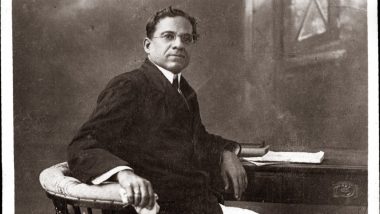Dhundiraj Govind Phalke, a stage magician during the British rule decided to sow the seeds of creativity, cimena and entertainment in India. Also known as Dadasaheb Phalke and Father Of Indian Cinema, it is the legend's 148th birth anniversary today. Dadasaheb Phalke began his career as a local photographer in Godhra and went on to become a magician later on after her met Carl Hertz, a German magician who worked for the Lumiere Brothers. He then also worked as a draftsman with Archaeological Survey of India but left it because of the job constraints. When he watched the silent film, The Life Of Christ by Ferdinand Zecca, he could visualise Indian Gods and Goddesses and viola, he then decided to plant the seeds of entertainment in India!
The legend also has a series of awards named after him. Anushka Sharma, Shahid Kapoor, ranveer Singh, have all been the recipients of the prestigious awards. He has had a very interesting life and got into cinema when it hadn't even started. He made India's first film, Raja Harishchandra, thanks to his wife's support. His son had a major role to play in the film and in fact, his entire family was involved in its making. (ALSO READ: Dadasaheb Phalke Excellence Awards 2018: Here is the List of Winners)
Here are some lesser known facts about the Father of Indian Cinema:
His early life
Dadasaheb Phalke was born in Trybakeshwar and his father was a Sanskrit scholar. He studied in JJ School of Arts in 1885 and from there he went to Kala Bhavan, Baroda where he learnt painting, photography and drawing.
His first film
After watching The Life Of Christ, he decided to make a short film, which was called The Growth of a Pea Plant. Directing the short film helped him produce Raja Harishchandra. He borrowed money from his wife to make Raja Harishchandra and his entire family was involved in the crew. His wife took care of costumes, food and water for the crew, ads, posters and a lot more.
His success story then on
After the success of his first film, he went on to making more films. In his 19 years of experience in Indian cinema, he made 95 films and 26 short films.
His days of struggle after the success
Phalke's last film was Gangavataran, after the emergence of sound films, his way of making films became outdated. He stopped making films after that and even suffered from temporary blindness, according to some reports. His intense viewing of pictures and films led to his ill-health and loss of sight.
Retirement and the Government honour
After making his last film, he decided to retire in Nashik. He died on 16th February 1944. In honour of the great filmmaker, the Government of India started the Dadasaheb Phalke awards in 1969.
Phalke's life is a true inspiration and receiving a Dadasaheb Phalke award is a matter of pride for everyone who contributes to the Indian cinema. What are your thoughts on this? Tell us in the comments below and stay tuned with us for more.
(The above story first appeared on LatestLY on Apr 30, 2018 01:09 AM IST. For more news and updates on politics, world, sports, entertainment and lifestyle, log on to our website latestly.com).













 Quickly
Quickly


